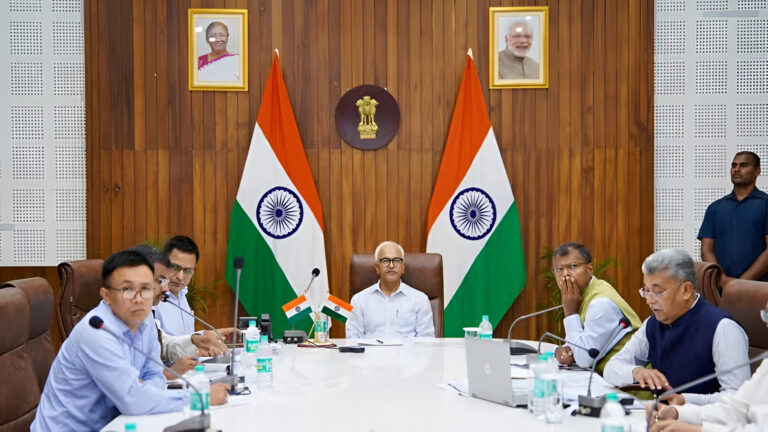Rongmei CSOs Lead Community Road Repair Initiative in Manipur
Summary
In a remarkable act of community service, the Rongmei Civil Society Organizations (CSOs) in Manipur took on road repairs to improve the deteriorating Tamenglong-Tamei-Tousem route. Led by the Rongmei Naga Council Manipur (RNCM) and other community groups, volunteers filled potholes and restored damaged areas. Their efforts, supported by local MLA Janghemlung Panmei, significantly improved road safety and demonstrated the power of community-driven action.
Full Article
Introduction: A Community Uplifts Its Own
Roads connect people, communities, and economies. When the roads deteriorate, the daily commute becomes a burden, businesses suffer, and the overall quality of life dips. This is exactly what residents in Manipur’s Tamenglong district were experiencing before the Rongmei Civil Society Organizations (CSOs) stepped in with a powerful message: if the government couldn’t immediately fix the roads, the community would. Their decision to repair the Tamenglong-Tamei-Tousem road not only showcased their dedication but also demonstrated the impact a small but united community can have.
The Motivation Behind the Repairs
The road connecting Tamenglong Headquarters to Tamei and Tousem subdivisions had been in severe disrepair for a long time. With worsening conditions impacting the lives of locals, the Rongmei CSOs decided to tackle the problem head-on. Led by Rongmei Naga Council Manipur (RNCM) president KC Savio, the team undertook two days of intensive repairs, filling potholes, patching damaged areas, and working tirelessly to create a safer, more accessible route for everyone in the district.
Why did they do it? The answer is rooted in the pride and commitment they feel for their community. Local residents depend on this road daily, and waiting for government intervention wasn’t an option when every commute was a struggle. As KC Savio noted, this initiative was about empowering the community to take control of its own well-being.
How the Repairs Were Executed
Organizing and executing a road repair project is no small feat. Here’s how the Rongmei CSOs turned their plans into action:
- Forming the Team: The project was a collective effort involving over 20 volunteers from various Rongmei organizations. Together, they planned the repairs, assessed which sections of the road required immediate attention, and mobilized tools and resources to begin work.
- Securing Support and Equipment: Local MLA Janghemlung Panmei lent crucial support by providing a JCB excavator. This machine allowed the team to handle the more intensive aspects of road repair, such as filling large potholes and leveling rough sections of the road.
- Working in Phases: The volunteers worked over two days, focusing on the worst areas first. They filled large potholes, laid fresh asphalt, and stabilized sections of the road that had deteriorated beyond usability.
- Receiving Community Support: From start to finish, the project was fueled by local encouragement. Residents expressed their gratitude and admiration for the Rongmei CSOs, viewing this initiative as a much-needed solution to a pressing issue.
The Significance of Community-Driven Projects
In today’s world, where many people look to the government for every solution, the Rongmei CSOs’ actions are a refreshing reminder of what communities can accomplish on their own. The initiative provided immediate benefits, such as:
- Improved Safety: Fixing the damaged road reduced the risks of accidents, especially for motorcyclists and smaller vehicles.
- Economic Boost: With a smoother, more reliable road, local businesses can transport goods more easily, supporting economic growth in the area.
- Strengthened Community Bonds: Acts like these create unity, pride, and a sense of shared purpose. When a community pulls together, it’s a morale boost for everyone involved.
This initiative is also a model for other regions, showcasing that when citizens join forces, they can address local issues without waiting for external intervention.
The Role of Local Leaders and Government Support
Although the project was community-driven, local MLA Janghemlung Panmei’s contribution exemplified how leaders can aid such grassroots efforts. By providing machinery, he helped ensure that the volunteers could work more efficiently, allowing them to complete a more durable repair.
This kind of collaboration between community members and government officials is vital in making a lasting impact. It shows that while communities can take the lead, partnerships with local leaders can amplify their effectiveness. Going forward, the CSOs and MLA Panmei hope to maintain the repaired road and perhaps inspire similar collaborations across the region.
Why Grassroots Initiatives Matter More Than Ever
While government agencies have an essential role in developing infrastructure, community-led projects like these are powerful because they are immediate, localized, and focused on the actual needs of the people. In rural or underserved areas, these initiatives fill gaps that might otherwise be left unaddressed due to funding limitations or bureaucratic delays.
Moreover, grassroots movements foster a sense of responsibility and involvement among residents. When people see the direct results of their efforts, they feel more connected to their community. This sense of ownership often leads to better maintenance and more respectful use of local resources.
Long-Term Impact and Future Plans
The success of the Rongmei CSOs in restoring this road is more than a short-term win; it’s a foundation for future initiatives. As KC Savio and his team plan the next steps, they aim to engage in regular maintenance and keep the road in good condition year-round. They also intend to work with government bodies to ensure these repairs become part of a long-term improvement strategy.
In a broader context, the Tamenglong road repair initiative sets a new standard for rural and semi-urban areas in Manipur and beyond. When a community takes the lead, others are likely to follow, leading to wider improvements in infrastructure, quality of life, and civic engagement.
Conclusion: The Power of Self-Reliance
The Rongmei CSOs’ road repair initiative is a testament to self-reliance and unity. By taking the lead, they not only improved a critical infrastructure component but also showcased the importance of community empowerment. Their story is one of resilience, determination, and the unwavering belief that even a small group of people can make a difference.
FAQs
- Why did the Rongmei CSOs decide to repair the road themselves?
Due to prolonged disrepair and community hardships, the CSOs took immediate action to improve daily commutes and overall safety. - Who supported the road repair project?
Local MLA Janghemlung Panmei provided essential machinery, allowing volunteers to execute the repairs effectively. - What impact has the road repair had on the community?
The repairs enhanced road safety, supported local businesses, and inspired a stronger community spirit among residents. - What does this initiative mean for other rural communities?
It serves as an inspiring model, showing that community-driven efforts can lead to impactful, immediate changes. - Will there be further repairs and maintenance on the road?
Yes, the Rongmei CSOs and local leaders plan to maintain the road and consider further improvements in the future.



